10 Favorite Facilitation Card Decks (and How to Use Them)
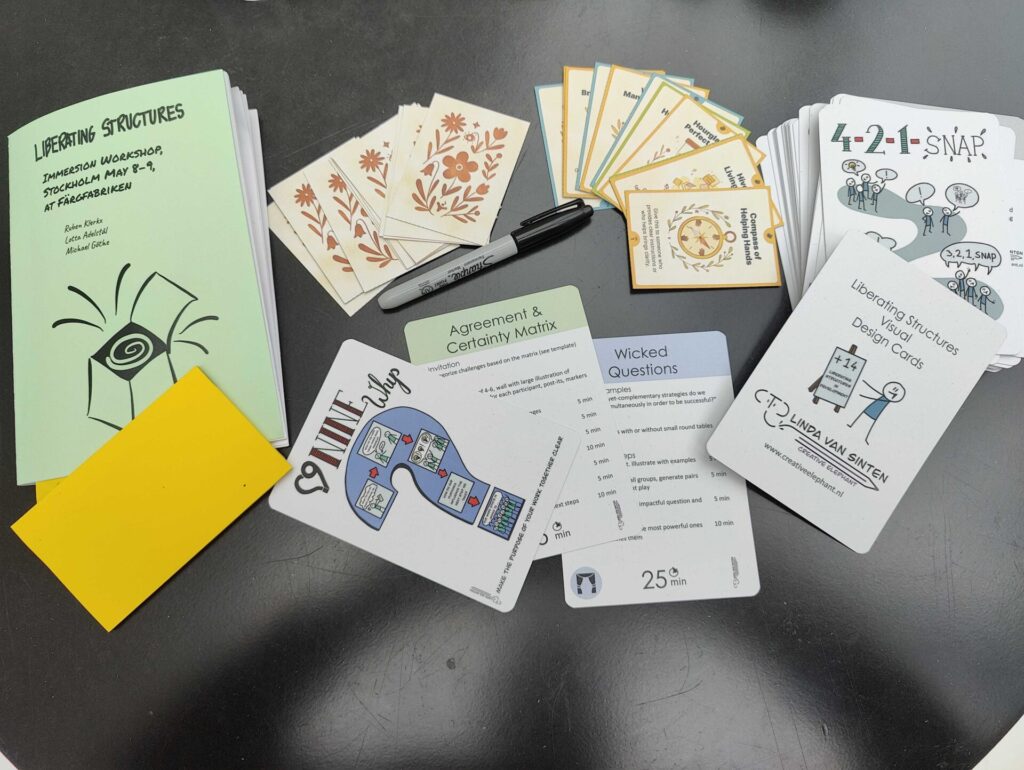
Facilitators love card decks. Why? They're tactile, visual, flexible, and reliably powerful. Whether you’re mapping a system, guiding reflection, or helping a group build connection, there’s something magical about putting a beautiful, idea-rich card into someone’s hands.
Combined in an opening or reflection activity, card decks feel like an invitation: to pause, to imagine, to engage with the work a little differently. Many card decks include inspiring illustrations, designed to awaken the imagination and introduce some wonder into your workday.
Here’s why facilitation card decks are such trusted tools:
- They help spark creativity when the blank page feels daunting.
- They’re quick to grab when you need a new idea, fast.
- They encourage hands-on engagement.
- They offer just enough structure, without being overly prescriptive.
- They can be playful or profound—or both.
- They’re a great way to learn and teach facilitation methods.
In this article, we’ve collected our favorite 10 card decks for facilitators, together with a few ideas for how to use them in your workshops.
Top tip: these also make excellent gifts for the facilitator in your life. Looking for the perfect birthday or holiday present for a workshop designer? Or for a great idea on how to thank a co-facilitator for the great work done? You’re in the right place. (Of course, that doesn’t mean you cannot gift them to yourself. Please do.)
Why use facilitation cards
At their core, facilitation card decks are collections of prompts, activities, methods, or visuals designed to support group work and collaboration. They might offer exercises, reflective questions, method ideas, or evocative images: anything that helps guide or enrich a process.
Facilitators generally use them in one of two ways:
1. For yourself
- As a design aid: think of them like a physical version of the SessionLab library and drag & drop agenda planner. You can lay out methods on a table, shuffle the order, explore what fits best.
- As a creative spark: draw a card when you’re stuck and let it guide your next move.
- As a learning tool: get familiar with new methods and build your toolkit.
As a craft, facilitation is made of many interconnected parts (tools, methods, mindset…) that compose an articulate system. I’ve often thought that cards lend themselves better than a (linear) manual to explaining what facilitation is and how it works, because of the possibilities of reorganizing and rearranging all the different parts. More like creating a model than like telling a story.
2. With participants
- As an interactive activity: let participants draw cards randomly, or choose ones they are drawn to, and share some thoughts.
- To support dialogue: use cards to surface insights, structure group work, or create shared understanding.
- To bring in beauty: well-designed cards are visually appealing, and just fun to use. Surprise and awe are solid pathways to making learning experiences more memorable.
I also like to leave a deck of illustrated cards (usually Dixit cards) on the table for anyone to look through or fidget with. In my experience, this can support focus and comfort, especially for those of us who are neurodivergent, or who find it easier to engage when there’s something to interact with beyond just the trainer.
Digital vs physical facilitation cards
There’s a special magic to physical cards. A beautifully printed deck you can shuffle, hand around, or spread across a table brings joy in the room, and there is a benefit in having participants focus on a physical object while they talk. This is a similar principle to Lego Serious Play ® workshops, and in fact any workshop introducing physical artifacts: it helps us to “think with our hands”.
Most of the card decks listed below are available for purchase, but if you are on a budget, many creators also offer print-your-own versions. I’d recommend bringing the files to a professional printing place to get them nicely printed and, most importantly, professionally cut!
Many decks are also available digitally. Some can be used directly in tools like Miro or MURAL (check out SessionLab’s own Workshops & Wizards on Miroverse). If you plan to integrate facilitation cards in an online workshop, it’s worth checking on the cards’ main website for any dedicated apps and web tools to use on the go. Whatever you do, make sure to test online tools before any virtual sessions!
Now, onto our favorites. There are dozens of beautiful decks out there: this selection only includes cards we’ve used ourselves here at SessionLab (and, in one case, even designed).
1. Facilitator Cards
Created by Meg Bolger and Sam Killermann of FacilitatingXYZ fame, this 60-card deck is like a Swiss Army knife for facilitators. Each card represents an activity or method, grouped by purpose (e.g., opening, exploring, closing).
You can design an entire session by laying out a sequence of cards, or pull one mid-workshop when you need to adapt. They’re great for in-the-moment pivots.
And they’re beautifully designed: simple, intuitive, and focused on what matters most. The white space on the front is erasable, allowing you to use it to jot down your own notes, reflections, observations or, perhaps, the timing you need for each activity.
The same team also set up Virtual Facilitator Cards that include principles and activities for online facilitation.
Best for: Session design
Available at: facilitator.cards
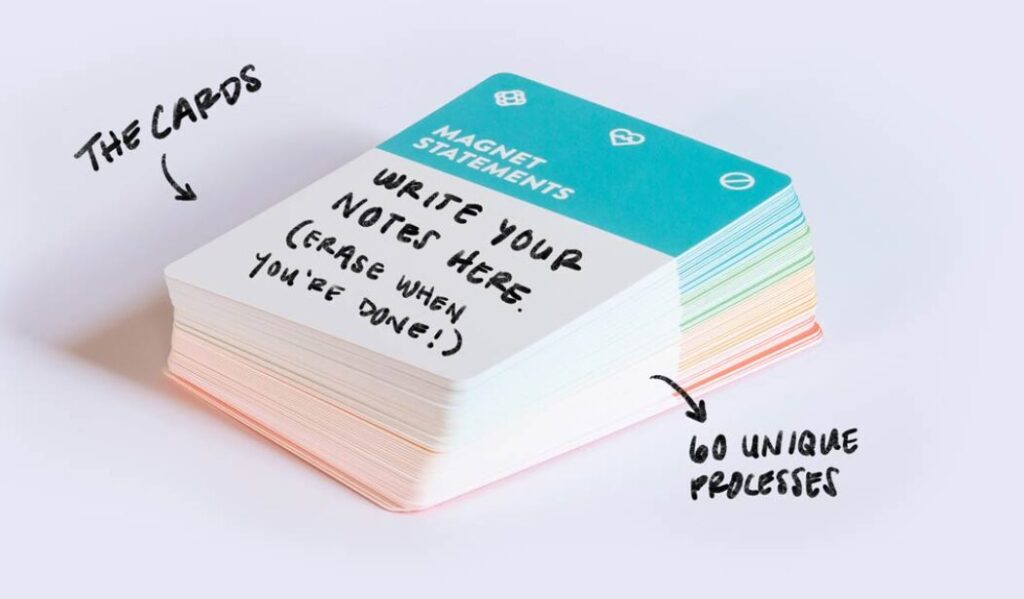
2. Workshop Tactics PIP deck
Yes, it’s pricey. But you’re essentially getting a facilitation masterclass in a box. Each card outlines a practical workshop tactic with clear steps, when to use it, and why it works.
It’s structured enough for beginners, yet expansive enough for pros. Great for those leading strategy, design, or innovation sessions, for team leads, and for anyone who wants to learn a lot about creating better workshops, in quick, digestible chunks. Like all other PIP decks, you can get a physical deck or an online version, which comes with a video class on how to use them, an associated Miro template, and more resources.
Not sure if it’s worth it? Try a tester PDF, for free.
Best for: Deep diving into learning, alone or in a team
Available at: pipdecks.com
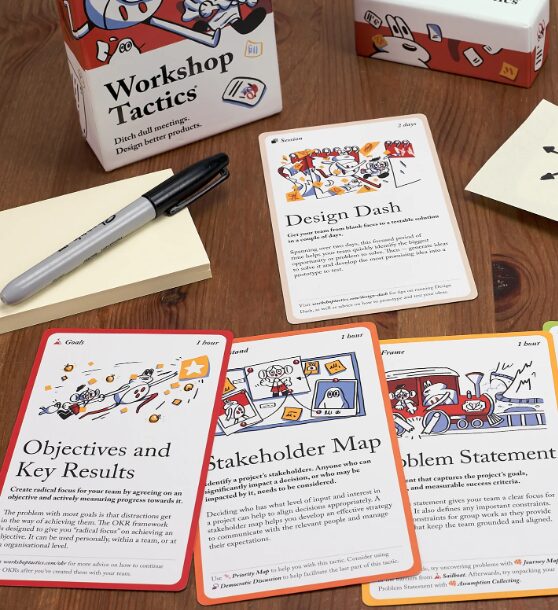
3. Workshops & Wizards
Okay, we had to include our own! Workshops & Wizards is a gamified card deck designed to help teams build facilitation and soft skills. Think Dungeons & Dragons meets team learning.
It’s especially useful for L&D teams, internal facilitators, and those who want to make facilitation skills training more engaging. SessionLab’s Head of Content, James Smart, created the Workshops & Wizard cards custom, as a support for our own internal training on facilitation skills (what can I say, we lean nerdish over here!). We enjoyed them so much we decided to follow-up with a public version.
In this article, you’ll find all the information you need to start sharing some facilitation magic with your groups, including ideas for activities you might want to run.
The Workshops & Wizards cards are currently available in digital format and print-to-play, but if there is enough interest, we’ll print some real-world decks as well, so let us know if that is something you’d like to see.
Register your interest in a physical copy of Workshops & Wizards using the link below.
For online workshops, you can explore and play directly in this Miro template. Do let us know how it goes!
Best for: Training in facilitation and soft skills
Available at: SessionLab, print-to-play
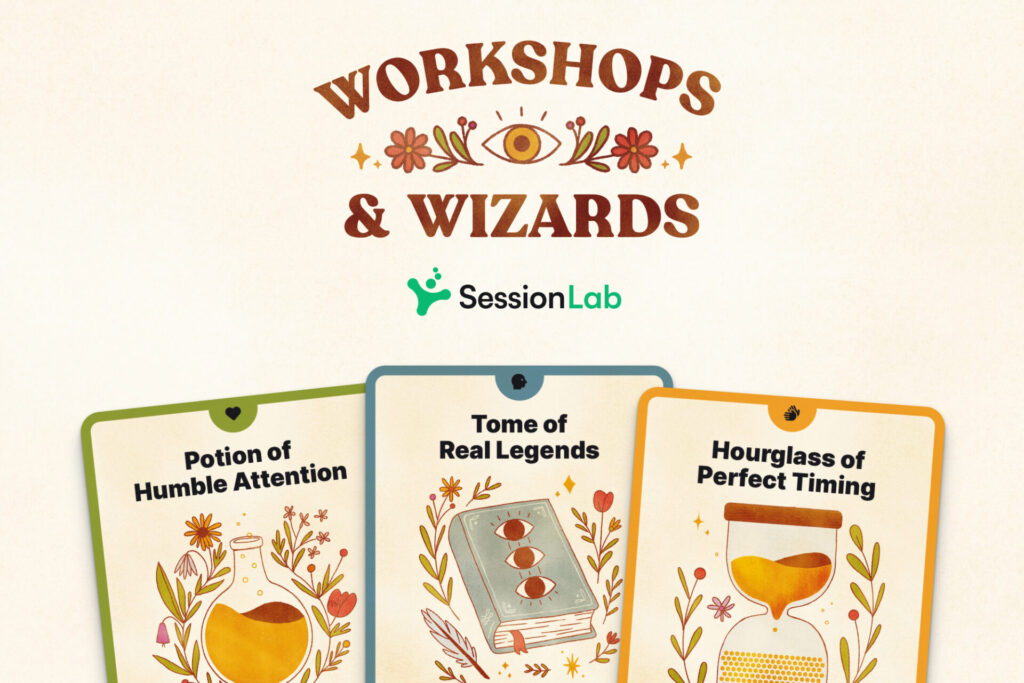
4. Liberating Structures Cards
Liberating Structures are often quoted as the most used methods in facilitation, and for good reason. These microstructures bring clarity, engagement, and inclusion into group processes. Each Liberating Structure is essentially a replicable, modular facilitation method, and they work well combined in “strings”.
These cards are a great way to learn more about Liberating Structures, keep a handy reminder of all the different possibilities, and make designing the right flow for your next workshop simple and fun.
A deck of Liberating Structures Design Cards has 57 cards:
- A set of cards with the 33 Liberating Structures;
- 6 cards that explain how to use the deck;
- 8 extra cards providing extra guidance for some of the most commonly used structures (such as 1-2-4-all, Impromptu Networking, and Open Space Technology);
- 11 bonus cards with tips and variations;
- Plus, the deck comes with poster illustrations and three ready-to-use workshop templates.
Each card consists of three elements: space (how the space is arranged and what materials are needed), invitation (a question to ask for ideas or proposals), and the sequence of steps (the order of actions and time allocation). And yes, you can also find all the Liberating Structures in the SessionLab library.
Best for: Designing participatory sessions
Available at: TheLiberators.com

5. IDEO Method Cards
This deck from IDEO shares 51 design methods used in their human-centered design process. Each card is a mini-lesson in how to understand users, generate ideas, and prototype solutions.
Great for design thinking workshops, brainstorming ideas, user research planning, or adding a spark of curiosity to a team meeting. You can sort them by four color coded categories (Learn, Look, Ask, Try) and combine them to build your own process.
Having said that, I personally love the IDEO cards for their architectural, urban-cool design, and have used just the illustration part in various workshops with such prompts as:
- Pick three cards that describe this project and tell us why.
- Choose a card that symbolizes what you are taking home from the workshop and share it in your small group.
- Pick three cards at random and combine them into a story.
Best for: Sparking creative thinking
Available at: IDEO
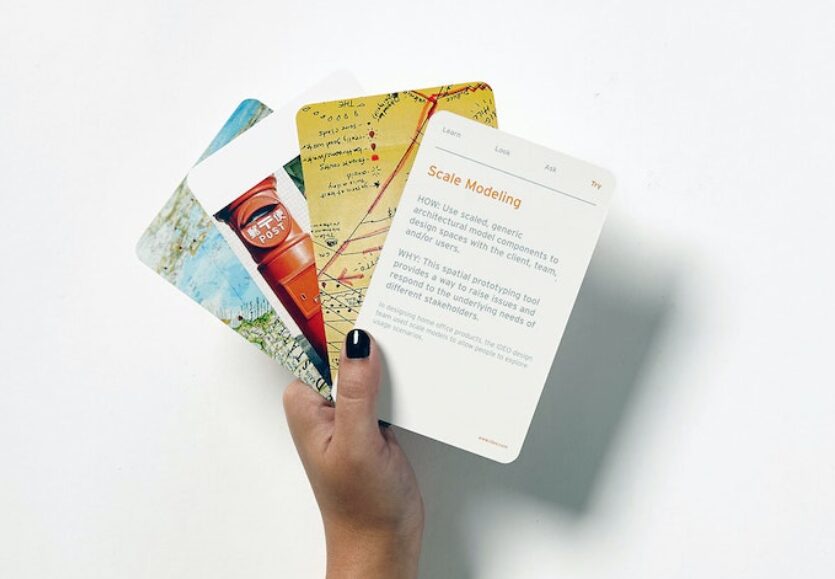
6. metaFox coaching cards
As there are a lot of different metaFox decks, and many different possibly ways of using them. I recommend starting out with a ready-made template, Peer Coaching with Pictures. As part of this starter package, you can download, for free, a print-to-play set, and see if the coaching cards are for you. The template will guide you step-by-step to invite participants to choose an image that reflects their current challenge or opportunity, then explore the story behind it. It’s ideal for beginners who want to hone their coaching skills!
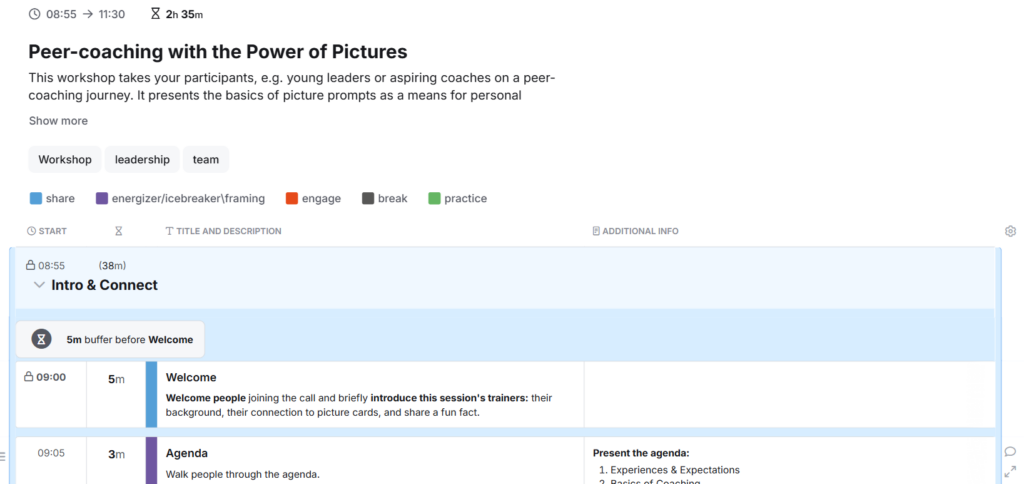
These cards use metaphorical images to support coaching conversations and stimulate emotional intelligence. They are meant to stimulate reflection in peer learning, team coaching, or helping participants access their intuition. Simple and powerful.
metaFox coaching cards are also available as online icebreaker questions with a bespoke tool.
Best for: Peer coaching and reflection
Available at: metafox.eu
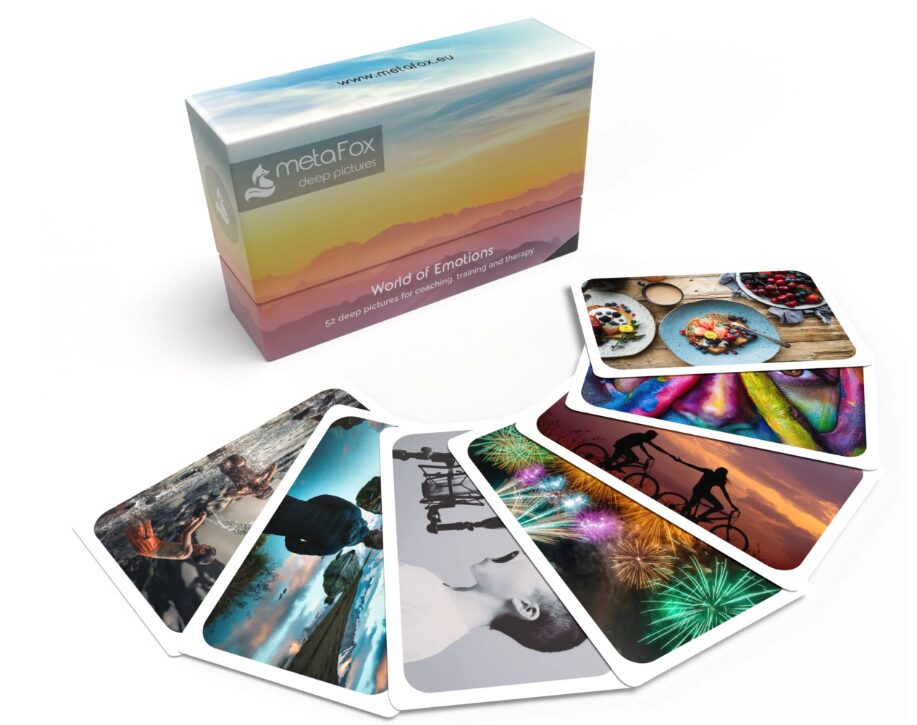
7. Dixit
Though originally a party game, Dixit cards are commonly used by facilitators for a reason: they’re rich in imagery, and completely language-independent.
Each card is a surreal, dreamlike illustration, ideal for opening up conversations and bringing imagination and wonder into the room. I often use them as icebreakers/connectors at the start of a workshop. When participants walk in, they find them all scattered prettily on a table (or if I have enough time for that, displayed in neat concentric circles!) as I ask them to select one, which questions such as:
- Which card represents your team right now?
- What does this project’s ideal future look like?
- Choose a card that sais something about how you are feeling right now.
Depending on how large the group is, the stories can be told in a full circle, or in small groups. This simple activity never fails to yield insight, surprises, exciting moments in which similar ideas or metaphors are shared (“yes we are like a boat on a storm! I picked the another image with water…”) and concepts to refer back to (“we’ll work on alignment on your vision next, like in the card Alan picked with the telescope..”)
Great for multilingual groups, visual learners, or any time you want to lower the barrier to deep conversation. Facilitators reading this, go to the comments section and confess: how many Dixit card sets do you have? (I have 5, which is a few more than I need, and I usually use the Visions or the Anniversary sets.)
Best for: Storytelling and metaphors, working in languages other-than-English
Available at: Game stores everywhere
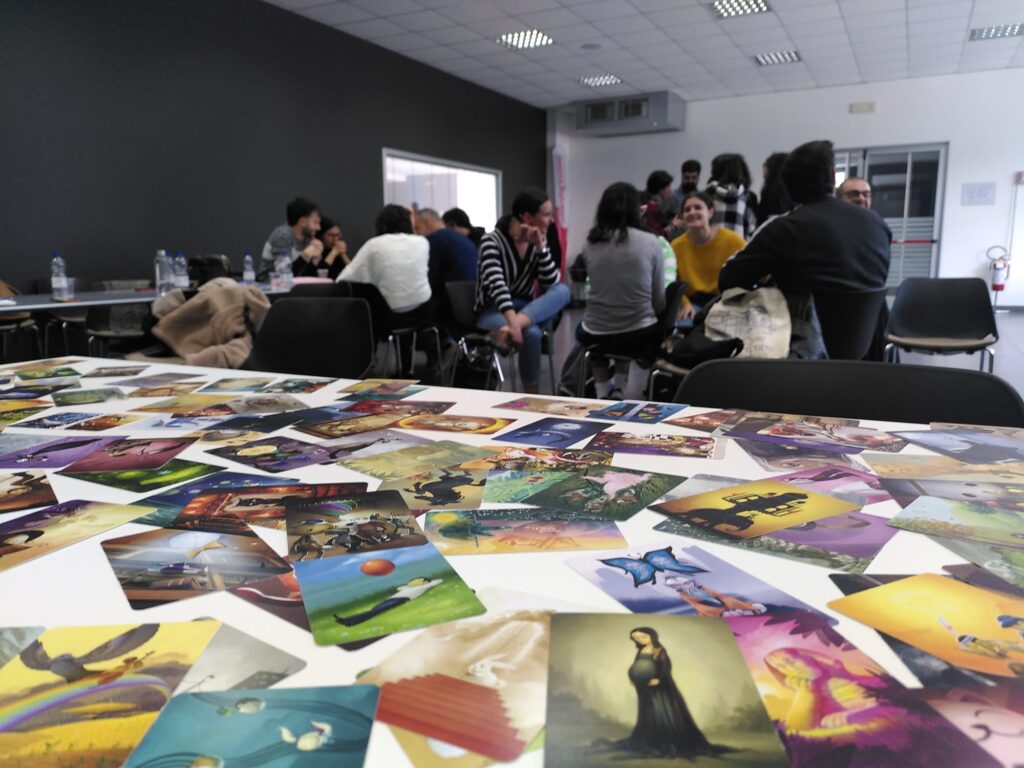
8. We! Connect Cards
You might have heard Priya Parker, author of The Art of Gathering, discuss the importance of what she calls magical questions.
A magical question is a question posed to a group that everybody in that group would be interested in answering, and everyone is interested in hearing each other’s answers.
Priya Parker
You can of course come up with your own magical questions, but the We! Connect Cards are a way to have a selection in your pocket at any time. Designed by Chad Littlefield, these 60 square cards offer prompts that range from light-hearted to thought-provoking. The different “levels” are easy to sort, with clearly color coded categories. They’re sturdy, practical, and perfect for warm ups at project kickoffs, retreats, or easing into a deeper workshop.
Besides the facilitation cards, this online shop is a treasure trove of useful gadgets for facilitation. I recently bought a pack of We! Connect sticker nametags to bring an extra boost of creativity to a large networking conference. Each sticker has space for attendees to write their name, as well as an interesting, no-nonsense conversation starter such as “I am trying to solve the challenge of..” and “I would love to know more about..”
Best for: Kickstarting authentic conversations
Available at: weand.me
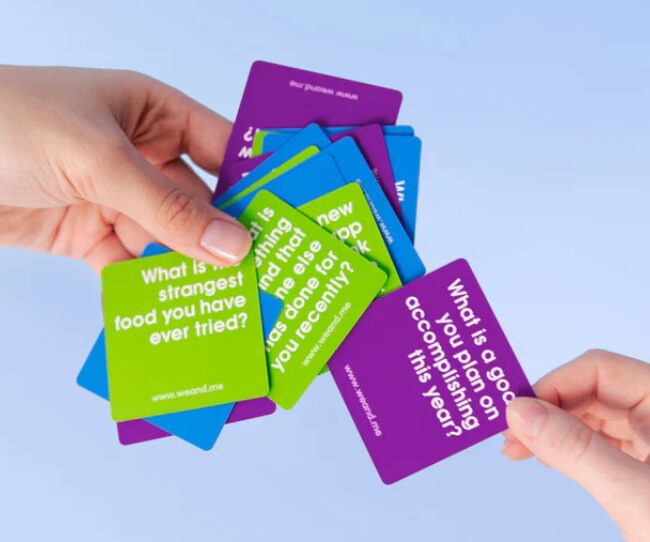
9. GroupWorks Card Deck
A bit older, but still a gem. GroupWorks offers 91 cards representing patterns of excellent group process, from simple things like “Circle” to complex patterns like “Whole System in the Room”.
The cards were created by more than fifty volunteers (the Group Pattern Language Project) from diverse organizational backgrounds who collaborated over three years to express the core wisdom at the heart of successful group sessions.
You can use them to reflect on a meeting, plan a workshop, or develop your own facilitation practice. They’re not tied to specific activities but help you think about how groups function best. I’ve had these since the beginning of my facilitation career and they’ve been a precious reminder to deepen my thinking and intention around how to best support group gatherings.
Also available as a free PDF, for the virtual space as an iPhone app, as well as in Spanish, German and French translations.
Best for: Understanding group process
Available at: groupworksdeck.org
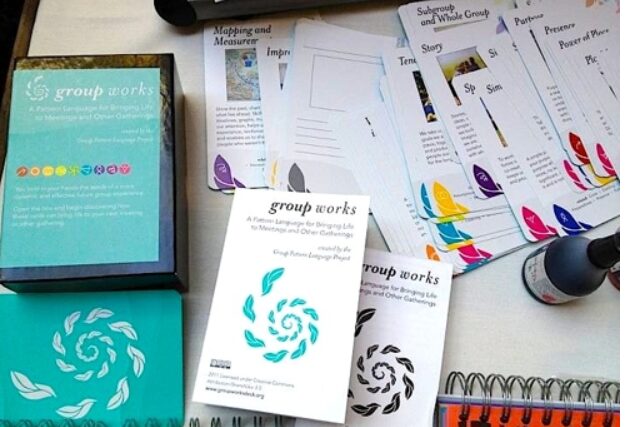
10. AI Tinkerer’s Cards
This niche but timely deck helps teams explore Generative AI: what it is, how it works, and how to put it to use. Useful to open up that particular can of worms with your team and figure out how to leverage AI tools in a way that works for you. The cards were designed by Alexandre Eisenchteter, with input from the AI Tinkerer’s Club as training tools. Besides the deck itself, you’ll find resources, templates and activities all aimed to familiarize small teams with the potential of AI.
We’ve used these cards at one of our recent SessionLab team retreats to share knowledge on how AI assistants work and discuss both how to best use AI tools to make our work more effective, and how to support facilitators through AI. Later in the year, we launched a revamped AI Assistant that can help speed up and improve design work, automatically translate your sessions, add relevant context, tweak text based on the intended audience and more. That is to say, these cards worked for us!
Best for: Training on AI with teams
Available at: AI Tinkerer’s Cards, print-to-play
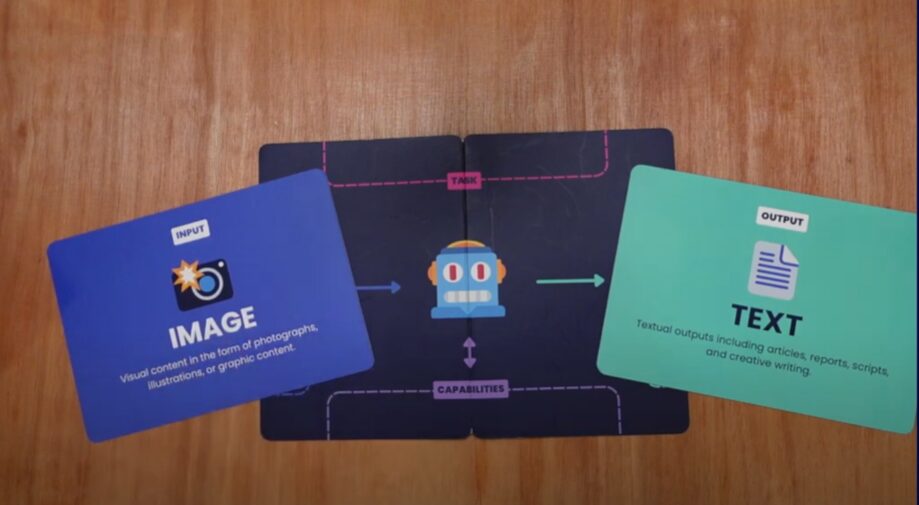
Bonus: Make your own cards
Turns out print-to-play is not the only low-cost way of getting some brand-new facilitation cards. You can also have participants create their very own, bespoke deck! Creating their own set of workshop flashcards is a brilliant way to encourage reflection, debrief a training session, and give everyone a gift to bring home.
Want to make it happen?
Just prep some blank cards and provide:
- Markers and pens
- Magazines
- Scissors and glue
- Time
Invite your group to reflect and capture:
- Tools they’ve learned
- Insights from the session
- Ideas they want to try
Find more details in SessionLab’s Library of facilitation methods.
Which facilitation cards do you love?
Facilitators tend to geek out over cards (guilty as charged). If I am not entirely sure what activities to run at a certain event, I’ll certainly slip a pack of Dixit cards in my bag, just in case. On my library shelf, there are even more, including a couple of decks in Italian only (my own version of facilitation training cards that come with the book Facilitiamoci, and this fun set of group archetypes from a book called The Village).
How about you? What decks do you love? Which ones do you reach for again and again? Drop your recommendations in the comments, or come share in our friendly facilitator community!

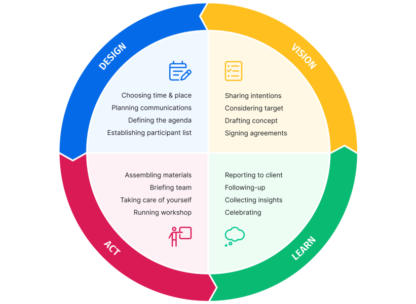
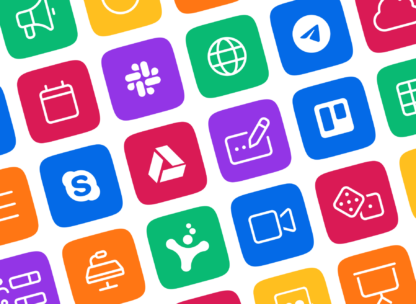
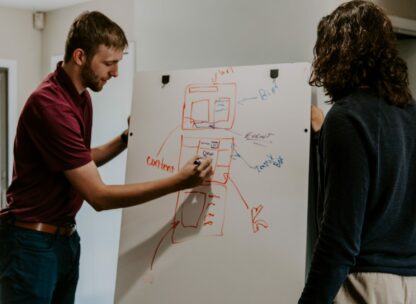
Leave a Comment